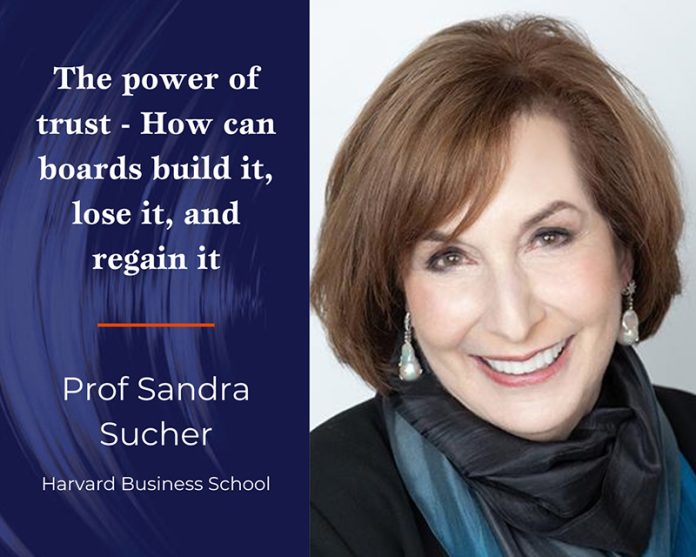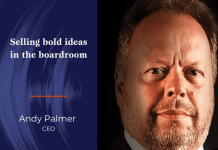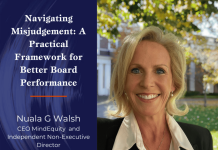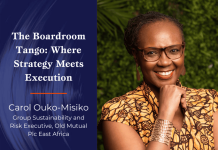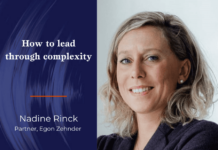The podcast and the article are brought to you by The Better Boards Podcast Series.
Trust is the most potent force underlying the success of every board. When trust is in the room, great things can happen. Yet it can be shattered in an instant, with a devastating impact on the performance and effectiveness of the board and, potentially, ultimately, a company’s market cap and reputation. How can boards build and sustain trust in the boardroom and with stakeholders? When it is lost, what can boards do to regain it?
In this podcast, Dr Sabine Dembkowski, Founder and Managing Partner of Better Boards discusses trust with Professor Sandra Sucher, Professor of Management Practice at Harvard Business School and an internationally recognized trust researcher. “The Power of Trust: How Companies Build It, Lose It, Regain It” is her third book, based on two decades of research on global companies’ best practices and the gray areas of business. She is also on the Edelman Trust Institute advisory board and collaborates with Deloitte on TrustIQ™, a proprietary tool measuring key elements of trust in major organizations. She also collaborates with PwC on their Trust Leadership Institute.
“The board is pivotal”
Sandra starts with her opinion that boards are probably the most important contributor to companies being trusted. In the global environment, trust is a multi-stakeholder issue, and organisations are expected to consider shareholders, customers, employees, and the communities where they do business. Sandra explains that her experience demonstrates that the real issue is that boards need to be the permission givers for many of the actions companies and their leaders need to take.
“Trust always focuses on this notion of willing vulnerability”
Sandra explains that trust is a willingness to be vulnerable to the actions and intentions of others. We trust organisations and leaders but are then vulnerable to how they exercise their power over us. So trust is always rooted in an action that we expect the other party to perform – it is grounded in action.
“I’m more or less willing to take risks depending on whether or not I trust the other people in the room”
Sandra explains that, importantly, research confirms that trust is built from the inside out. It isn’t easy to be trusted by people outside an organisation if the people within it don’t trust each other. A boardroom is a small group environment where lots of risk-taking is required, as people need to talk about difficult issues, and the willingness to do this depends on trust.
“The first thing that board members can do is just be clear on what it is that they’re good at, what they’re there for, and to make sure that they actually can do that really well”
Sandra outlines a formula or framework for the basis on which people trust. Firstly, individuals and organisations trust that the other party is competent, without which there is no reason to trust. So board members need clarity about their role and their competence in their expected role, and this includes technical competence but also managerial competence. The second basis on which people trust is motive because if we are vulnerable to someone else, they have power, and what is motivating them is very important. Motives are the way that we show whose interest we take into account. She explains that the third dimension of trust is what she refers to as means, and to be seen as operating fairly and having fair means. Lastly, she covers impact, judged separately from the first three. This is the real, on-the-ground effect of their actions on us, the net effect of their actions, be they positive and beneficial or negative. Those four dimensions, competence, motives, means, and impact, are ways in which any board member can expect to be judged.
“The why is what gives me insight into your motives”
Sandra feels that one of the essential things board members can do is talk about why they believe a particular action is required, especially in difficult situations. Debate about actions is not as useful as debate about the reasons for action, so that people can be clear on the goal – and the actions that will fall out of that. What you think should be done, and why gives insight into your motives and reasoning.
“Do a good root cause analysis and fix the steps that need to be fixed”
Sandra explains that there is much empirical research on recovering from lost trust and outlines the ‘apology formula.’ The first thing is to acknowledge the harm done and apologise for it. The best apologies are always grounded in a perspective that starts with what we have done and that we are sorry – making it very clear that we understand what we have done. This starts to build some confidence to trust again. The second thing is to explain what happened, avoiding corporate-style apologies in the passive voice, “mistakes occurred,” but in active language – “what we did wrong.” Then they can build confidence in our ability to fix things. The third step is to offer a solution. What will we do about it? One way is to make whole, to make a direct offer of repair, and the second is committing to fix the source or root of the problem.
The three top takeaways from our conversation are:
- Boards have a central role in helping companies become trusted, and both earn trust over time and recover it if it’s lost.
- Inside the board, it’s essential to be mindful of building trusting relationships. That is hard work, but it pays off enormously in the contentious decisions that boards must make.
- When facing a big decision, board members should question, ‘in this decision, will this cause us to earn or to lose trust, and with whom?’
Don’t forget to subscribe never to miss an episode of the Better Boards Podcast Series. Available on their website, Apple, Spotify or Google.
To find out how you can participate in the Better Boards Podcast Series or more information on Better Boards’ solutions, please email us at info@better-boards.com.


